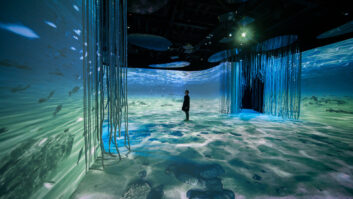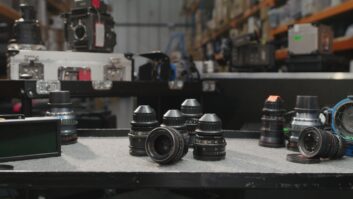What if the workplace were an Out of Home Experience? Yeah I can hear the comments now. But stay with me.
In this issue we look at the work of the Chicago agency Next/Now. Their experiential installs for corporate settings run the gamut from giant large format LED-enabled extravaganzas to virtual showrooms on your phone. These installs demonstrate how data can drive display and how interactivity can be touch or tablet, in-person or hybrid. It got me thinking.
I’ve come up through AV when corporate integrators often didn’t know what the content was going be and didn’t really want to know. Certainly, integrators who were doing theme parks, museums, etc. did have to connect to the content and they would bring that sensibility to corporate visitors’ centers and even lobbies. They would collaborate with quality content designers, but that type of collaboration was not the norm 14 years ago when Next/Now was founded.
Now it’s more common and the value proposition is better understood. That expertise is still expensive but it’s more widely available and maybe more widely appreciated. Certainly anytime AV can be directly tied to marketing— or even better to sales—it can make budget available to take better advantage of what AV can do.
The other shift is that quality design—by designers—can do more to break the barrier with architects and interior designers who don’t always see the potential of screens + architecture. I don’t blame them. But that gap can sometimes close and that trend will likely continue as displays and content become more aesthetic and more acceptable to the screen-connected generations, now the majority. Hopefully our look at the Next/Now work shared here gives some food for thought and sales meetings.
Also in this issue we’re introducing a new column—Jargon Patrol and Bad Ideas. Our contributing editor Eric Wenocur is appropriately skeptical, and I think we can all relate. His examples are pretty elementary, but that’s the point. We may take for granted that basic knowledge is handed down via DNA, but it’s not. It’s learned. Or not learned as the case may be.
I hear from a lot of you that people coming into the industry don’t know stuff. Well to be fair, they may know different stuff, but if stuff means physics and electricity and signal distribution best practices, I think we can agree there are some gaps.
Maybe knowing basic applied physics is going the way of the stick shift and for some of the same reasons, but things come back into style because they’re practical and they matter, not just for nostalgia. And don’t we just want to be knowledgeable about what’s under the proverbial hood of the signals that course through our lives?
I mean why be an engineer if it’s not to know things that other people don’t?







